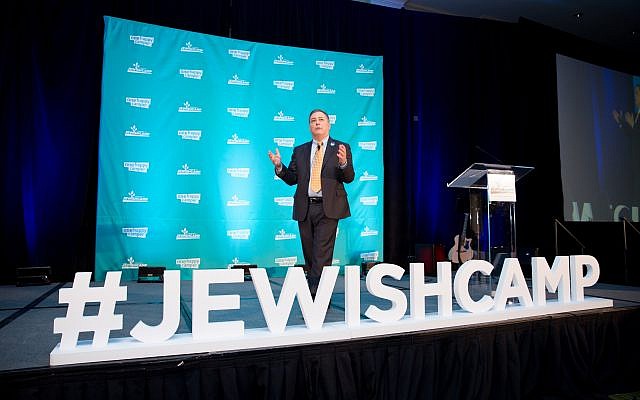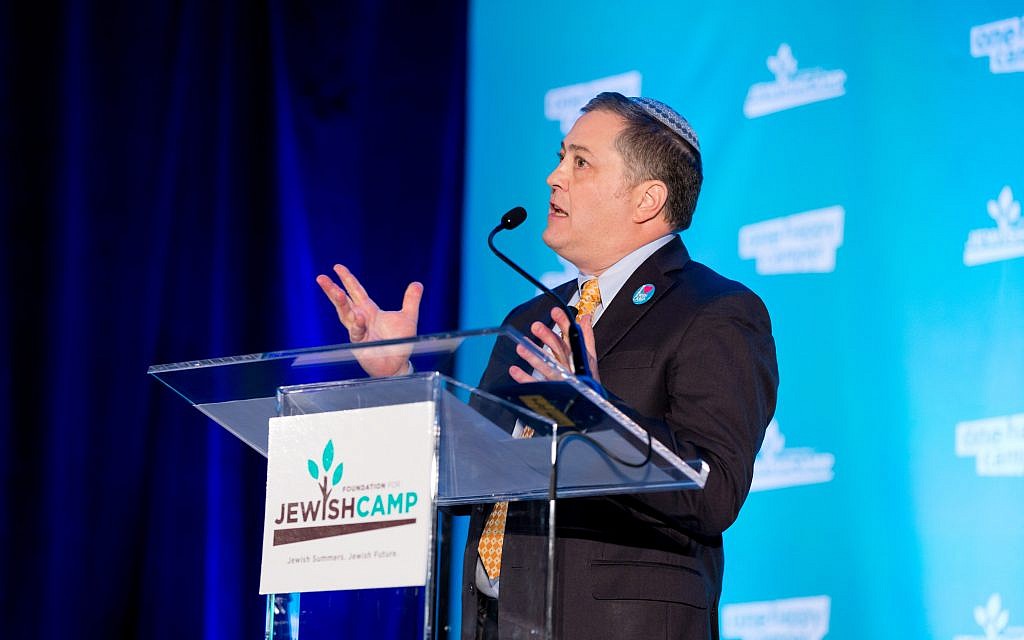Atlanta Camps Are Breeding Ground for Innovation
Fingerman met with representatives of overnight and day camps along with professionals of the Jewish Federation of Greater Atlanta and Jewish lay leaders.

Having so many camp offices based in Atlanta provided an efficient way for visiting Foundation for Jewish Camp CEO Jeremy Fingerman to gain feedback last week, pass on knowledge and learn how to help camps expand their reach. It also allows the foundation to pilot innovative camp experiences in Atlanta that can be passed onto the rest of the country.
Fingerman met Feb. 7 with representatives of overnight and day camps along with professionals of the Jewish Federation of Greater Atlanta and Jewish lay leaders.
FJC’s mission is to advocate, convene and serve as a catalyst for growth for camps.
“Atlanta is a wonderful Jewish community overall and a wonderful Jewish camp community,” Fingerman said. He added that very few communities have such a range of camps in one city, including Camp Judaea, Camp Ramah Darom, the Union for Reform Judaism’s Camp Coleman and the Marcus JCC’s Camp Barney Medintz.
One of FJC’s focuses is accelerating the level of innovation in the field. Technology is changing so rapidly, and camps have to continue to evolve, innovate and adapt to compete in today’s world, said Fingerman, himself a former Camp Ramah camper. He spent more than 20 years as a corporate executive with such companies as General Mills, Campbell Soup Co. and Manischewitz before becoming FJC’s CEO nine years ago.
Some of the areas he spoke with the Atlanta camps about included recruiting staff, year-round engagement and attracting families with young children.
Attracting Counselors
“Camp is all about campers, but the real linchpin is counselors. Jewish counselors are role models. They transmit the values of the camp to the campers,” Fingerman said.
Camp directors spent two weeks in Israel recruiting counselors or shlichim. More than 1400 shlichim staff Jewish camps.
But recruiting counselors, in general, is not easy, he said. Many camps face the challenge of retaining well-qualified and trained students of college age when they decide internships are more valuable to their future careers than working at a camp.

FJC is trying the change that viewpoint, working with camps to rephrase how they attract counselors by touting the value and relevancy of being a camp counselor to career readiness. Fingerman cited the college, career and life readiness skills students can learn being a counselor, including problem solving and better communication, “human skills they need to function successfully, with a Jewish soul and spirit and in a positive Jewish way.”
It comes down to how staff are trained. Fingerman pointed to Camp Coleman’s reflective time given to counselors to learn what worked and what didn’t. “Coleman has done a fantastic job. We need to study and replicate and scale up [similar programs] across North America.”
In 2007, FJC started a pilot program to gain insights about camper satisfaction with the camp experience. From six camps and 500 respondents, the program has grown to include 73 camps and 15,000 respondents, Fingerman said. FJC collected data and shared with those in the camp field, and several years ago it started to develop a survey to gain insight into staff satisfaction.
Year-Round Engagement
“The summer is getting shorter and shorter. Schools are getting out later in the spring and starting earlier in August. There are less weeks available for traditional camp. There are a lot of competing interests in the summer.” For example, families may consider skill-building academic opportunities, athletics, vacation or travels. Camps that are the most successful are those that can engage families and campers throughout the year, Fingerman said.
Many of the Atlanta camps have family camp and winter break camp, he said. “Sometimes they come from multiple generations to family camp to try it together and spend some time together in a positive Jewish experience.”
Young Families
Children are generally introduced to day camps before overnight camping. Those include the MJCCA’s Camp Isidore Alterman and specialty camps, and the growing In The City Camp. The goal is to attract young families to Jewish camps as opposed to secular day camps, he said. If they chose a Jewish day camp, they will be more likely to move on to a Jewish overnight camp and other Jewish activities, Fingerman said.
“What we know is that Jewish camp works. It’s fun, engaging, energizing and connects [campers] through a joyous Jewish experience. Kids who come to Jewish camp feel an emotional attachment to Israel, an association with Judaism, [and later] affiliate with Jewish institutions and donate to Federation. Camp is a critical part of the Jewish journey. We know Jewish camp works for building a more vibrant Jewish future, leadership and creating lifelong connections, lifelong friends.”
Over the past decade, enrollment in Jewish camps in North America has grown 20 percent. Today, there are more than 300 Jewish day and overnight camps, Fingerman said. Last summer, there were more than 180,000 Jewish campers and counselors, “so it’s a big enterprise.”



comments